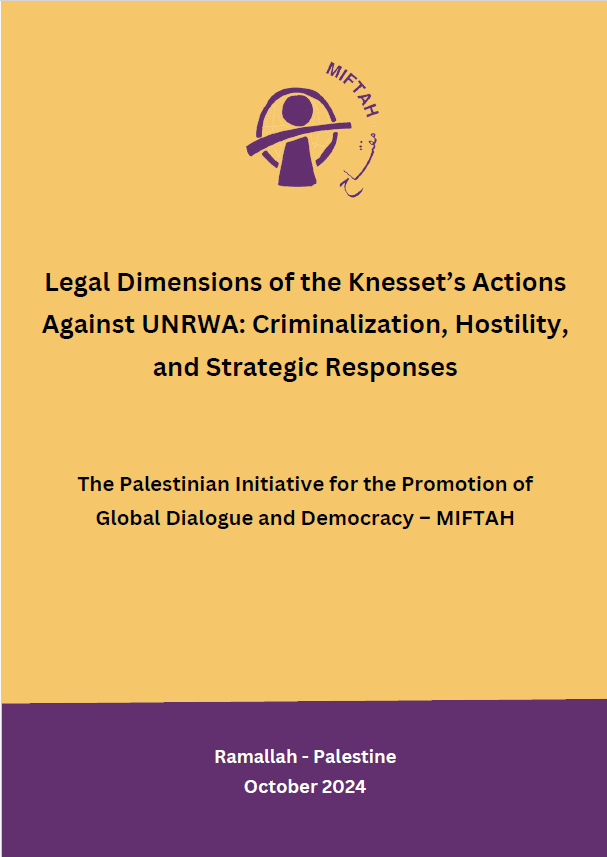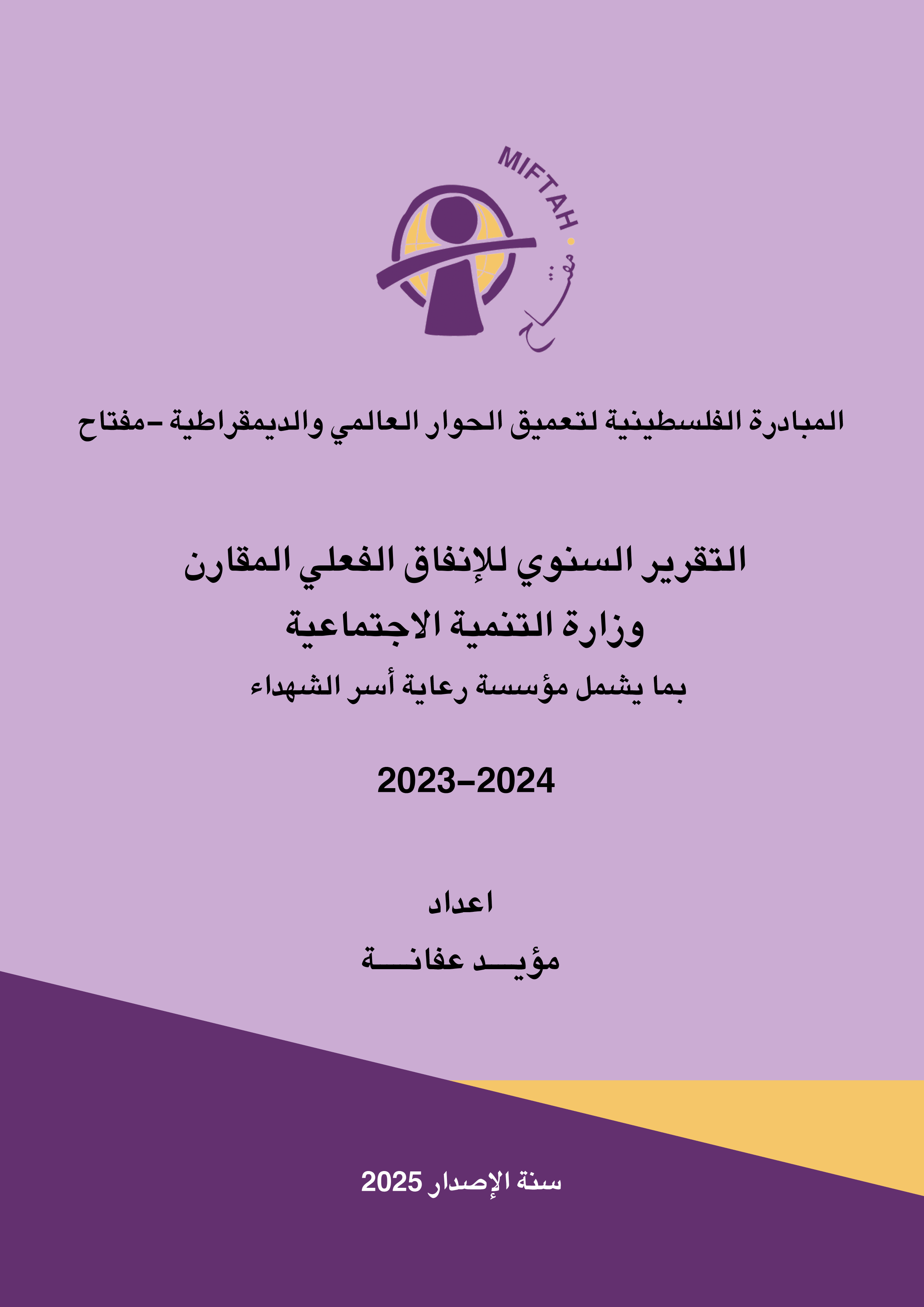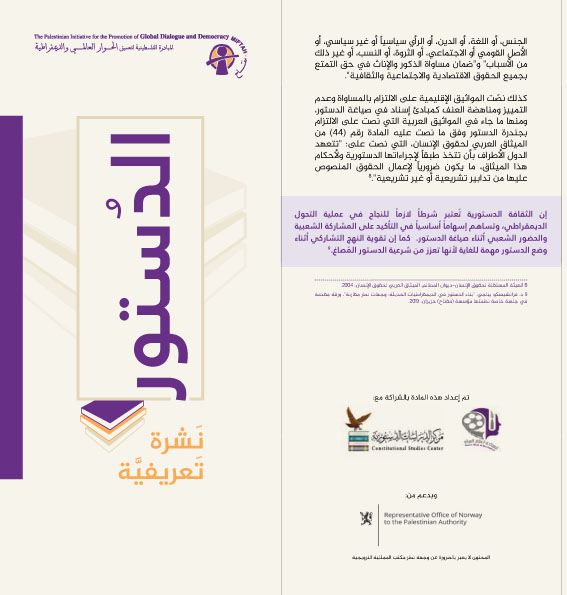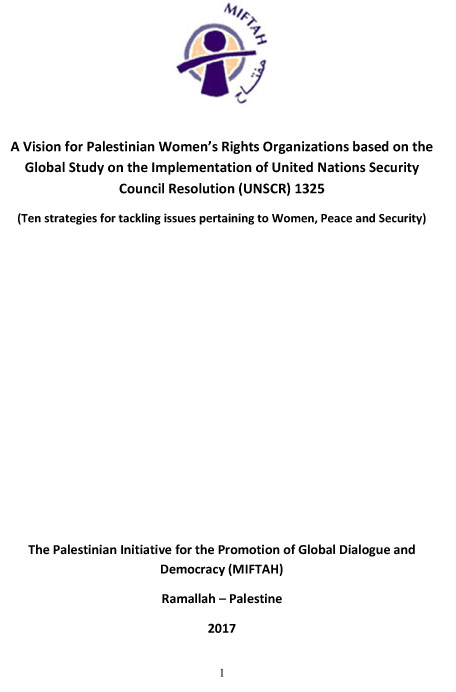Kerry talks peace while Israel bars UNESCO mission [May 19 - May 25]
Date posted: May 25, 2013
By MIFTAH

President Mahmoud Abbas and Israeli Prime Minister Benjamin Netanyahu both met with US Secretary of State John Kerry this week in the latter’s fourth visit to the region since he assumed office.
After meeting with the two to ostensibly find ways to restart stalled negotiations between the two sides, Kerry urged on May 24 both Israeli and Palestinian leaders to take "hard decisions" to revive the peace process.
"We're getting toward a time now when hard decisions need to be made," he said at the end of his visit.
Kerry admitted a day before after meeting with the two leaders that there was skepticism and cynicism about his efforts to revive talks.
"I know this region well enough to know there is skepticism, in some quarters there is cynicism, and there are reasons for it. There have been bitter years of disappointment," he said. Still, he maintained: "It is our hope that by being methodical, careful, patient, but detailed and tenacious, that we can lay on a path ahead that can conceivably surprise people and certainly exhaust the possibilities for peace."
British foreign secretary William Hague was also in the region visiting with leaders on both sides and even visited the Bedouin community of Khan Al Ahmar between Jerusalem and Jericho, whose residents are under the threat of displacement.
On May 23, Hague was poignantly clear on where his country stands on Israeli settlements in the West Bank. "Israel has lost some of its support in Britain and in other European countries over time - this is something I've often pointed out to Israeli leaders -because of settlement activity, which we condemn,” he said.
"We strongly disagree with settlements on occupied land. Israel is a country we work with in many ways but we do disapprove of settlements,” he maintained, adding that: "We want to see both Israelis and Palestinians really commit themselves to the peace process while there is still a chance of a two-state solution."
In Khan al Ahmar, Hague listened to the residents’ grievances from Israeli efforts to push them out to make way for more settlement expansion. "We (in Britain) strongly condemn the building of settlements and recognise they are a severe threat to a two-state solution,” he told the people there.
On March 21, Israeli forces demolished two residential buildings in the Jabal al-Mukabbir in East Jerusalem. Earlier, they demolished two Palestinian homes in al-Tur, all under the pretext of unlicensed construction. Dozens of people have been left homeless from the demolitions.
A UNESCO fact-finding mission was supposed to arrive this week to look into Israeli measures in the Old City of Jerusalem and their impact on the archeological, cultural and heritage significance of the place, but was denied entry by Israel on May 20. Israel justified its decision by saying Palestinians were trying to politicize the visit.
"The Palestinians were not respecting the understandings,” an Israeli foreign ministry official said. “The visit was supposed to be professional, (but) they were taking measures that showed they were politicizing the event and not letting the delegation focus on professional sides of it," the official said.
UNESCO maintained that the mission was not cancelled, but postponed, the agency’s spokeswoman Sue Williams said.
The Palestinians said they expected Israel to pull something like this. “We weren't surprised by this decision because we believed that Israel's agreement to (allow the mission) was not convincing," minister of foreign affairs Riyad Al Malki said.
The Rafah crossing between the Gaza Strip and Egypt was reopened on May 22 after a five day closure. Egyptian soldiers and policemen closed the crossing following the kidnapping of seven Egyptian soldiers in Sinai, only reopening it after the soldiers were freed. Over 2,400 Palestinians had been stranded on both sides of the crossing during the days of the closure.
Extremist Israelis extended their attacks this week all the way to the Negev desert. On May 19, residents of the Retamim Kibbutz attacked the nearby Bedouin village of Bir Hadaj and set fire to a tent, according to head of the local village council, Salman Ibin Hamid
"The setters of Retamim are acting like they are in the West Bank," Ibn Hamid said. "These people have the mentality of the occupying settler to attack every Arab."
Finally, on May 23, the US appointed Gen. John Allen as special envoy on security issues in negotiations between Israel and the Palestinian Authority. According to a US official, Allen will deal with the U.S. position on Israeli security needs and the security arrangements that would accompany the establishment of a future Palestinian state.
Al Nakba commemorated amid increasing settler attacks [May 12 - May 18]
Date posted: May 18, 2013
By MIFTAH

This week Palestinians commemorated the 65th anniversary of the Nakba, the catastrophe of 1948 on May 15, with a variety of activities, demonstrations and events throughout the Palestinian territories and outside of its borders. Festivals were held in Ramallah and Nablus in addition to several protests and confrontations with Israeli occupation forces. In Jerusalem, clashes broke out between protesters and Israeli police and border guards when Palestinians commemorating Al Nakba, raising Palestinian flags and facing off with Jewish settlers and soldiers. Thirty people were wounded or arrested during the clashes in addition to six Israelis.
The Jerusalem clashes come at a time when settler break-ins to Al Aqsa have been on the rise amid increasing calls by extremist Jewish groups to make a presence at the compound. The break-ins have become a near daily event. Muslim worshippers and Palestinian youths have kept constant vigil at the mosque to stave off the break-ins which included settler groups who used children as a cover to enter the compound on the occasion of Shavuot.
Settlers in the West Bank have wreaked havoc this week as well. On May 17, three Palestinians were injured in clashes in Urif south of Nablus when dozens of settlers set fire to lands in three area-villages: Urif, Einabus, and Asira al-Qibliya. The settlers also attacked citizens and threw burning tires at people’s homes.
Jewish extremists attacked inside the Green Line as well. On May 14, extremists set fire to three cars and sprayed racist graffiti on a mosque south of Haifa, according to Israeli media reports.
"Price-tag" and "Eviatar," which is thought to refer to the name of a settler stabbed to death last week, were found on the mosque’s walls in addition to the Star of David. In Safed, even farther north, racist graffiti with the words "Arabs out" was found on walls in the city.
On May 13, Israeli settlers exhumed a number of graves and sprayed racist graffiti in the Sawiya village in Nablus. Ghassan Daghlas, head of the PA settlement activity file, said settlers from the Alia settlement were responsible for the damage.
On the same day settlers from Tel Hatimar begin building a religious school for children on Al Khader lands in the Bethlehem area.
The Israeli army meanwhile, uprooted over 1,200 olive tree saplings on May 16 and razed land Palestinian farmer in the northern West Bank, according to Daghlas. He said the army dug up over 40 dunums of farm land and demolished a water tank and stone walls in Ras Karker, near Nablus.
On May 17, three Palestinian laborers were wounded in Beit Ula northwest of Hebron after Israeli forces fired rubber-coated steel bullets and unleashed police dogs at them according to Issa al-Amla, coordinator for the popular struggle committee. He said Omar Al-Amla, 31, and Abdulkadir Al-Amla, 28, suffered multiple dog bites to the neck and hands. A third laborer, Jihad Saleem, was shot in the leg.
In Jerusalem on May 17, Israeli forces raided the home of Iyad al-Awar and insisted on taking his two children 6-year-old Qassam and 5-year-old Nasrallah for “interrogation”. While their father prevented the forces from arresting his boys, Israeli soldiers handed him a warrant ordering him to bring his children to the Russian Compound for questioning.
"We arrived to the Russian Compound and the troops wanted to take my kids for investigation; I refused and they beat me in the ear and the leg. My kids started crying and were so scared from the troops. They took my kids by force," al-Awar said.
Israeli Intelligence officers apparently questioned the children about their detained cousin Shadad, and asked if they had seen him throwing stones or Molotov cocktails at Israeli forces, Al Awar said.
On the same day however, Palestinians scored a tiny victory in the Jerusalem suburb of Abu Dis when they were able to tear a hole through part of the separation wall. Protesters marking the Nakba anniversary ripped a 4-meter hole in it, eyewitnesses said. Clashes ensued between the protesters and Israeli soldiers who fired tear gas and rubber-coated steel bullets. Several injuries were reported.
Peace Now reported on May 16 that the Israeli government planned to grant retroactive approval to four West Bank settlement outposts it had previously pledged to at least partially demolish.
The Israeli state attorney's office said that settlers had purchased the private Palestinian land on which they built, thus paving the way for the government to give its blessing.
"In the response, the government declares its intention to legalize four outposts, in isolated areas," Peace Now said in a statement, adding that the strategy was an affront to US Secretary of State John Kerry's efforts to revive dormant Israeli-Palestinian peace talks. "The intention to legalize outposts as new settlements is no less than a slap in the face of Secretary Kerry's new peace process," Peace Now said.
On May 14, Hamas and Fatah agreed in Cairo to form a national unity government within three months during which they would finalize and approve the Palestine National Council elections law. The two sides, represented by Fatah leader Azzam Al Ahmad and Hamas politburo member Mousa Abu Marzouq, came to the agreement under Egyptian sponsorship and said President Abbas would immediately begin talks on the new government formation. Once the government is formed, general elections can be held.
More settlements announced despite US peace efforts [May 5 - May 11]
Date posted: May 11, 2013
By MIFTAH
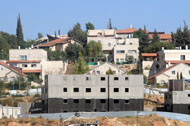
The Israeli government announced on May 9 that it will build 296 new homes in the settlement of Beit El near Ramallah. Hagit Ofran of Peace Now denounced the move. "This initiative proves Netanyahu is deceiving the world," she said.
"On the one hand, he lets us believe that he is putting the brakes on settlement and on the other, he gives the go-ahead for an enormous building project." Earlier in the week, Israeli Prime Minister Benjamin Netanyahu had reportedly ordered a freeze on new settlement tenders in the West Bank.
Chief PLO negotiator Saeb Erekat said the new settlement homes sent a clear message to Washington that Israel was not interested in resuming talks.
"We condemn this new decision which is proof that the Israeli government wants to sabotage and ruin the US administration's efforts to revive the peace process," he told AFP.
"This is a message to the American administration and a blow to the peace process," he said, saying it would drag the region into a cycle of violence rather than towards peace.
Settlers meanwhile continued their rampages in the West Bank. On May 10, Jewish settlers uprooted about 80 olive trees and scrawled graffiti near Al Tawani village south of Hebron.
Also on the 10th, Ibrahim Awad, 21, was hit by a bullet in the head during clashes in Beit Ummar, according to popular committee spokesman Yousef Abu Maria. Abu Maria said Palestinians were protesting continuous settler attacks in Hebron. Twenty other Palestinians were injured with rubber-coated steel bullets during the clashes.
Furthermore, 14 people were injured by rubber-coated steel bullets in clashes in Silwad northeast of Ramallah. One protester, Asif Hami, 17, was hit twice in the head and suffered severe bleeding.
On May 10 Israeli occupation forces demolished properties in the Bartaa industrial zone in Jenin. Mayor Ghassan Qabha said Israeli military bulldozers and vehicles razed the facilities because they were not licensed. The installations demolished include a used car parts warehouse, a car servicing shop and an iron shop. Eight demolition orders were also given to property owners, allowing them three days to vacate their properties, Qabha said.
On May 6, Israeli forces issued demolition orders to 11 homes in the Ramallah-area of Deir Nidham, all located near the settlement of Halmish. Around 40 people will be made homeless if the demolition orders are carried out.
On May 8, Israelis celebrated what they call “Jerusalem Day” commemorating the occupation and unilateral annexation of east Jerusalem following the 1967 War. Tens of thousands of Jewish settlers pranced through the Old City, carrying Israeli flags and banging on Palestinian doors. Israeli police vacated the city to make way for the hours-long marches but Palestinians raised Palestinian flags and chanted pro-Palestine slogans at Damascus Gate. Clashes ensued and over 30 Palestinians were arrested, including three children between the ages of seven and 12. A day later, Israeli minister of religion Naftali Bennett said he would seek to amend a law that would allow Jews to pray at Al Aqsa Mosque compound.
"We would like to ensure that Jews who want to pray there can do so," he said. “Tours” by Israeli settlers and extremists have become a daily occurrence at Al Aqsa, but according to Israeli law, they cannot perform Jewish prayers inside.
A settler from the east Jerusalem settlement of Gilo stabbed a Palestinian cabbie on May 7, seriously wounding him. Khalil Shawish 51, had driven the settler to his destination at four in the morning when the settlers pulled out a sharp object and stabbed him. According to Shawish’s brother, he was stabbed six times in the shoulder, chest and thigh before the settler escaped. He said his brother was in hospital but could not talk because of a stab wound to the lung.
Bedouin in the Negev Desert protested this week after Israel approved a draft law on May 6 to implement the Prawer-Begin plan, which would result in the displacement of tens of thousands of Bedouin residents. According to the Association for Civil Rights in Israel, the plan would forcibly evict nearly 40,000 Bedouins and destroy their communal and social fabric, condemning them to a future of poverty and unemployment.
The Bedouin community being threatened by the plan staged a protest in front of Netanyahu’s office in Jerusalem and threatened with escalatory measures if the plan goes into effect.
In local news, several people were injured on May 11 when residents of the Hebron-area town of Sair clashed with Palestinian police following the shooting death of a local woman. Angry residents opened fire and threw firebombs the night before on a police station with police officers firing back. The clashes came on the back of the shooting death of Khalida Kawazba, 30. Kawazba was killed when PA police opened fire at the car she was traveling in with her husband, who is reportedly wanted by PA security services. A security source said police had ordered Kawazba to stop, but he instead accelerated, "forcing police to open fire."
Finally, Muslim cleric Yousuf al-Qaradawi is in the Gaza Strip on a controversial visit, which has been sharply criticized by the PA in the West Bank and several factions in the Strip. The leadership has said Qardawi’s visit would contribute to the ongoing political split. Qardawi meanwhile spoke to the people of Gaza during Friday prayers on May 11 and urged them to continue resistance. "I advise all the people of Gaza to be patient and continue to build their country, and continue resistance," the sheikh told worshipers at al-Omari Mosque.
"We will not give up on the resistance, and we will not give up our arms," he added.
He also called on Palestinians to implement national reconciliation. A day earlier during a meeting with deposed Hamas premier Ismail Haniyeh, Qaradawi warned that nobody has the right to cede "any part of Palestine."
Qaradawi came to Gaza as head of a delegation of 50 clerics from 14 countries.
Meanwhile Haniyeh granted Qaradawi a Palestinian passport. In response, the PA Ministry of Interior has said the passport was “fake”, notifying countries that recognize Palestine to take legal action to seize the passport if it is used.
Finally, and Hondurus announced that they had established diplomatic relations on May 10, during the Foreign Minister Riyad Al Malki’s Central America tour.
Settler attacks on the rise in the West Bank [April 28 - May 4]
Date posted: May 04, 2013
By MIFTAH
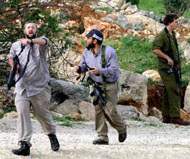
Israeli settlers stepped up their attacks in the West Bank this week after a settler was fatally stabbed on April 30 at the Zaa’tara checkpoint in north of Nablus. A Jewish settler from the Nablus-area settlement of Yitzhar was stabbed to death by Salam Abu Zaghal from Tulkarm near the checkpoint. Settlers immediately began carrying out retaliatory attacks, attacking Palestinian cars and property in the area.
Settlers attacked and wounded a Palestinian farmer near the village of Furiq and uprooted some 100 olive trees near the village of Qaryut. According to Palestinian sources, settlers also started over 50 fires across the West Bank on April 30.
Hundreds of olive and almond trees were damaged and large areas of cultivated crops were destroyed, the sources said. Jewish settlers also attacked a mosque and hurled stones at Palestinian cars, including two buses with schoolgirls, injuring over 20 people.
Settlers also set up a settlement outpost near the checkpoint where the settler was killed. Settlers hooked the mobile homes up to electricity connections and brought in settlers to take over the area. The Israeli army later dismantled the outpost on May 3.
On May 3, settlers continued their attacks on Palestinian land, burning down 40 olive trees in Kufr Qaddum. On the same day, settlers from Ofra uprooted 50 trees in the Ramallah-area village of Deir Jreer.
According to the Israeli daily Maariv, the Israeli government has allocated NIS22 million to build and expand settlements in Jerusalem on the occasion of what Israel calls “Jerusalem Day”, celebrating the unilateral Israeli unification of the city next week.
On April 29, Israeli occupation authorities also demolished three homes in Al Tur neighborhood of Jerusalem, claiming they were built without a license.
Another major development this week was the meeting between the Arab ministerial delegation and US Secretary of State John Kerry in Washington on April 29. The delegation, headed by Qatari Prince Hamad and Arab League chief Nabil Al Arabi, ostensibly travelled to the US to talk to officials there on ways to revive the Arab Peace Initiative and restart negotiations between Palestinians and Israelis.
Instead, the delegation expressed willingness to ‘modify’ its 2002 peace initiative, accepting, in principle the idea of land swaps with Israel. The move drew praise from the US, calling it "a very big step forward." Even Israeli justice minister and head of the negotiating team Tzipi Livni said it could be a step forward. The praise did not spill over however to the Palestinians.
Member of Fatah's Central Committee Mohammed Shtayya criticized the move on May 2, saying land swaps should be a result of negotiations with Israel rather than an "advance payment" given by Arabs on behalf of the Palestinians. “If there are changes to the borders, land swaps must be on an equal basis,” he said. "If we give one centimeter, we must take one centimeter in return.”
He went on to say that Israel interprets the Arab attitude in a “very dangerous way,” saying Israelis will try to understand that this attitude allows them to talk about annexing settlement blocs as if they were part of the Arab Peace Initiative.
"I don’t think the Arab Peace Initiative should be amended, because if this case is open, it would be difficult to close it by any means," he concluded.
The development was also slammed by Hamas politburo chief Khalid Mashaal. Speaking with Al Jazeera, Mashaal said any such concession would harm the Palestinian cause.
Israeli Prime Minister Benjamin Netanyahu remained coy on the subject, but said on May 2 that he would put any peace deal reached with the Palestinians to a referendum. Israeli political sources have said the leadership was concerned that Kerry was trying to push Netanyahu to return to negotiations on the basis of the 1967 borders, something Netanyahu has so far refused to do.
On April 30, Israel also stepped up its military operations in Gaza, following a number of rocket attacks into Israeli territory, which caused no damages or injuries. 25-year old Haytham Al Mis’hal was killed and another Palestinian injured when Israeli planes fired a missile at his motorcycle west of Gaza City. Israel claims Mis’hal was involved in the rocket attack on Eilat last month. The Salafist Mujahedeen Shura Council said Mis’hal was one of its members and claimed responsibility for the rocket attack as well.
The rocket fire prompted Hamas to carry out arrests of several Salafists according to its interior ministry on May 2.
“The internal security apparatus has arrested fanatics calling themselves Salafists, for security and criminal reasons. There were no arrests made for ideological or political reasons," a ministry statement said. The Mujahedeen Shura Council has accused Hamas of arresting its members for political reasons, saying they are trying to thwart their rocket attacks on Israel, but vowed to continue nonetheless.
Finally, resigned Prime Minister Salam Fayyad – who President Mahmoud Abbas has said will continue in his post during the transitional phase – made some strong statements in an interview published on May 3 in the New York Times, calling the Palestinian leadership a ‘failure.” Fayyad said Fatah would “break down” and the PA was already “broke.”
"Our story is a story of failed leadership, from way early on," Fayyad said. "It is incredible that the fate of the Palestinian people has been in the hands of leaders so entirely casual, so guided by spur-of-the-moment decisions, without seriousness. We don't strategize, we cut deals in a tactical way and we hold ourselves hostage to our own rhetoric."
Issawi ends months-long hunger strike [April 21 - April 27]
Date posted: April 27, 2013
By MIFTAH
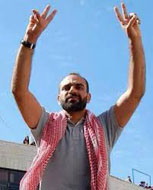
In a remarkable feat, long term hunger striker Samer Issawi ended his protest action on April 23 after signing an agreement with Israel which guarantees his release, his lawyer Jawad Bolous said. The deal will see Issawi released to his hometown of Essawiyeh, Jerusalem after serving eight months in jail, following 266 days of refusing food in protest against his re-arrest by Israeli forces. The agreement was signed at Kaplan Medical Center in Israel where Issawi is currently being held, and both his uncle and brother were present at the signing, Bolous said. Israeli officials reportedly agreed to the deal after Issawi said Monday that he would boycott any future court hearings and refuse to recognize the legitimacy of Israeli courts.
Samer Issawi "feels he achieved a victory thanks to his adherence to principles he believed in," his uncle Hani said. Issawi's victory was partly due to his rejection of Israeli efforts to deport him and so he "achieved a basic Palestinian goal of resisting exile and adherence to the right of return," his uncle added. He will be released from Israeli detention on Dec. 23.
On April 27 Israeli forces detained four children for allegedly throwing stones in Hebron, local sources said. The children, aged 8-12, were detained along with the father of one who tried to stop soldiers from arresting his son.
On April 26, Israel's army announced it would stop using munitions containing white phosphorus, after it was internationally condemned during a military operation against Gaza in 2008-2009. Ironically enough, this comes only after Israel’s criticism of Syrian President Bashar Al-Assad’s alleged use of chemical weapons against his own people. Shells containing the chemical "will no longer be used," according to Israel’s official statement. "In around a year, the Israeli military will have developed new munitions which can create smoke screens and that uses only gas. This will replace the current munitions which contain small amounts of phosphorus," it said.
On April 25, Israeli forces uprooted over 700 olive trees near Arraba village in the northern West Bank, Palestinian Legislative Council member Najah Abu Bakr said. The trees belonged to Palestinians in Arraba, south of Jenin, close to the Israeli settlement Mevo Dotan. Additionally, Israeli forces destroyed over 1,300 olive trees in the south Hebron hills of the southern West Bank on April 23.
Israel’s top legal official, Attorney General Yehuda Weinstein responded to the Association for Civil Rights (ACRI) in Israel, stating that Israeli security officials at Ben Gurion airport are legally allowed to demand access to tourists' email accounts and deny them entry if they refuse. Details of the policy were released by Yehuda Weinstein on April 24. In June 2012, ACRI's Lila Margalit wrote to the attorney general demanding clarification following media reports about security officials demanding access to tourists' email accounts before allowing them into the country.
"In a response dated April 24, 2013, the attorney general's office confirmed this practice," ACRI said, quoting sections of the document which said it was only done in exceptional cases where "relevant suspicious signs" were evident and only done with the tourist's "consent". "However, the attorney general's office also noted that while a tourist may refuse such a search, 'it will be made clear to him that his refusal will be taken into consideration along with other relevant factors, in deciding whether to allow him entry to Israel'," it continued. ACRI slammed the policy as a "drastic invasion of privacy" heaping scorn on the idea a tourist could freely give their consent while facing the threat of possible deportation if they refused. "Such 'consent' -- given under threat of deportation -- cannot serve as a basis for such a drastic invasion of privacy," Margalit said. "Allowing security agents to take such invasive measures at their own discretion and on the basis of such flimsy 'consent' is not befitting of a democracy."
This past Sunday marked Bethlehem’s first-ever marathon. Hundreds of athletes on April 21 braved freezing rain to take part in this historic race, which was won by a Palestinian runner from the West Bank town of Jericho. Some 500 runners, half Palestinians and half foreigners, took part in the different legs of the race, organizers said, which began at 8:00 a.m. as the West Bank town was buffeted by cold winds and an unseasonable downpour.
Around 100 competitors took part in the full 26 miles, while another 150 joined the half marathon, organizers said. Some 250 joined either the six-mile or three-mile races. Another 26 runners from Gaza were denied permission by Israel to travel to Bethlehem to join the race. Sunday's race, which is called the "Right to Movement Palestine Marathon" and is the brainchild of two Danish women athletes, takes runners on a tour of the hilly southern West Bank city which Christians believe is the birthplace of Jesus.
Etidal Abdelghani, deputy director general of the Palestinian Olympic Committee, which co-sponsored the event, said the aim of the race -- the first West Bank marathon to conform to international standards -- was to demonstrate just that. "This is a message that we have the right to move and to have sports events in Palestine without any obstacles," she said.
National unity government talks slated to begin 'very soon' [April 14 - April 20]
Date posted: April 20, 2013
By MIFTAH
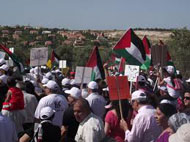
Following a PLO Executive Committee meeting on April 18, President Mahmoud Abbas announced that he would launch talks "in the near future" to form a new cabinet. The announcement came after the resignation of Prime Minister Salam Fayyad on April 13.
"We will hold consultations in the near future to form a government," said Abbas, according to a statement issued after the meeting. Later in the week, Fatah leader Azzam al-Ahmad said the president must also set a date for elections.
Such a move, of course would require the completion of the long overdue reconciliation process between Hamas and Fatah. On April 19, Hamas leaders met in Qatar to discuss this subject in particular.
Newly re-elected Hamas leader Khalid Mashaal chaired the meeting, which was also attended by Hamas leaders from Gaza including de facto prime minister Ismail Haniyeh. An unnamed source said the meeting began on Thursday and would run through until today.
The source said Hamas leaders would discuss "Palestinian reconciliation, developments in the Palestinian arena following Fayyad's resignation, as well as ways of pressing Israel to release Palestinian prisoners," the official said.
Fayyad, who will remain in the position of caretaker prime minister until a new government is formed, called on April 17, in his first public comments since his resignation, for a general election to rebuild the political system.
The Palestinians "need ... a general election, as the only way to rebuild our political system and achieve our national goals," he said in his weekly radio address. "Just as there is no state without Jerusalem as its eternal capital, there is no state without the Gaza Strip, a part that cannot be partitioned from it," Fayyad said.
He added that his departure did not mean he would no longer "defend our people's case and their fundamental rights of freedom and dignity."
Also on April 17, US Secretary of State John Kerry warned that time was running out to reach a Middle East peace deal, saying there could “only be a year or two left.”
Speaking to the House foreign affairs committee, Kerry said the Obama administration was "trying to find out what is possible."
He stressed he had no plan so far to lay out before Congress "because we're in the process of working that out with the critical parties."
"But I can guarantee you that I am committed to this, because I believe the window for a two-state solution is shutting. I think we have some period of time -- a year to year-and-a-half to two years -- or it's over," Kerry warned.
Peace seemed a long way off on the ground in Palestine. April 17 marked Palestinian Prisoners’ Day as hunger striker Samer Issawi continues to fight back death in his hospital bed inside Israel. Issawi has been offered a number of deals by Israel including deportation to Gaza, to outside the country and to serve out a five year sentence, all of which Issawi has refused.
On the occasion of Prisoners Day, Issawi called for "rage and solidarity".
"Greetings to all without exception. I urge all the noble people of our Arab and Muslim nation as well as the free people of the world to turn April 17, 2013 into a day of rage and solidarity with Palestinian prisoners all over the world," Issawi wrote in a letter sent through his lawyer.
"The voice of those heroes who have sacrificed and are still making sacrifices for the sake of the freedom of their people and land, and in defense for Muslim and Christian holy places in the holiest spot on the globe, should be heard."
Issawi also said no negotiations should be held with Israel until all Palestinians political prisoners were released. "All prisoners must be released before conducting any negotiations with the occupation regardless of how fruitful these negotiations could be." Issawi says he will continue his strike until he is released and returns to his hometown of Essawiyeh in Jerusalem.
Nine Palestinian prisoners declared an open hunger strike on the same day in solidarity with Issawi.
Democratic Front for the Liberation of Palestine detainees said they would end their strike upon Issawi's release to east Jerusalem.
Meanwhile, prisoner Mohammed Al Taj was given an early release due to his failing health on April 18. Al Taj was held at the Ramleh Prison Clinic, a place he described from his hospital bed in Ramallah’s Palestine Medical Center as “a graveyard for prisoners.” Al Taj suffers from pulmonary fibrosis and heart hypertrophy. His family has appealed to Saudi Arabia for medical treatment where they hope he may receive a lung transplant.
On April 19, Israeli settlers took over a monastery in the West Bank village of Al Taybeh near Ramallah, raising an Israeli flag over it. According to Priest Aziz Raei, the settlers used force to occupy the monastery and its adjacent chapel before raising the flag.
A day later, on the 18th Israeli forces demolished a store belonging to orphans from the Jirjawi family in Wadi al-Niam, a Bedouin village in the Negev.
"The demolition is immoral and unjustifiable. How can a state which claims to be an oasis of democracy and equality explain demolition of orphans' homes and means of living?" said Labbad Abu Affash, head of the village committee.
In other news, also on April 18, Israel refused permission for 26 runners from the Gaza Strip to travel to the West Bank to run in the first Bethlehem marathon on April 21. Organizers say the race is the first event of its kind with more than 400 people registered to run, half of whom are Palestinians.
"The request of 26 Gaza residents to take part in the Bethlehem marathon was examined by the relevant authorities and it was decided to reject the request because it does not fall within the determined criteria for crossing from Gaza to the West Bank," a COGAT [Coordinator of Government Activities in the Territories] statement said.
Israel celebrated its Memorial and Independence Days this week. As Israelis waved flags and barbequed outdoors, thousands of Palestinians inside the Green Line participated in the March of Return on April 16 towards the demolished village of Khubeiza. The participants waved Palestinian flags and demanded the right of return for Palestinian refugees displaced in the 1948 war.
Four rockets were shot into Israel this week. On April 19, two rockets were fired from the Gaza Strip and hit southern Israel without causing casualties or damages. On April 17, two other rockets were shot into the coastal city of Eilat, this time from the Sinai Peninsula.
On a positive note, on April 19, 13 EU member states, including Britain, France, Spain and the Netherlands, announced they would label products imported from Israeli West Bank settlements.
Also, on April 17, the Israeli army began dismantling the fence around the settlement of Ofra after High Court decision ordered the action. In September 2010, a case was made by a resident of village of Ein Yabrud turned to the Court, saying the fence was built on his private land and prevented him from reaching some of his fields. The court had ordered the army to dismantle the fence by the end of 2012.
On April 15, President Abbas inaugurated the Palestinian embassy in Kuwait following a 22-year break in relations. The two countries resumed diplomatic ties after a long hiatus following late President Yasser Arafat’s support for Saddam Hussein during Iraq’s invasion of Kuwait in the first Gulf War.
Finally, on April 14. Israel announced it would extend the ban on family reunification between Israeli citizens and citizens of the Palestinian territories or “enemy states” for another year. The law prevents families of mixed citizenships to live together inside Israel.
Kerry talks economics as Fayyad/Abbas spat begins to settle [April 7 - April 13]
Date posted: April 13, 2013
By MIFTAH
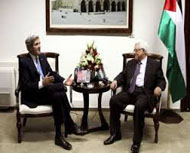
The United States is making it clear to the Palestinians that the resignation of Prime Minister Salaam Fayyad is not an option. On April 12, US Secretary of State John Kerry called up President Mahmoud Abbas to talk about his recent shuttle visit to the region aimed at jumpstarting negotiations between Palestinians and Israel, and also to reportedly ‘persuade” him to patch things up with his premier. Fayyad has said he would resign, most likely over the spat between himself and President Abbas following the resignation of finance minister Nabil Kassis early last month. While Fayyad immediately accepted the resignation, Abbas felt he had gone over his head with a decision that should ultimately be the president’s.
Abbas and Fayyad are scheduled to meet today in Ramallah, to “talk things over.”
Kerry’s visit to the region this week during which he met with both Palestinian and Israeli officials yielded an announcement by the Secretary of State that the US would soon be announcing a plan to boost the Palestinian economy. This was not, however, an alternative to a political path, which Kerry says he is still trying to get back on track. Israel and the Palestinians have so far refused to return to the negotiating table, with each side saying the other had to make the first step. Palestinians remain adamant that Israel must halt settlement activity, offer a map of borders for the future Palestinian state and release at least the 123 prisoners arrested before the Oslo Accords were signed before they return to the table. While the Israeli press said this week that Israeli Prime Minister Benjamin Netanyahu may accept a limited release of prisoners, nothing has yet been officially announced.
Meanwhile, the Palestinians are angry with Canada. On April 12, the PLO lodged an official complaint with Canada after its foreign minister, John Baird attended meeting with Israeli Justice Minister Tzipi Livni at her office in occupied east Jerusalem.
"Your recent meeting with Israeli officials in East Jerusalem has the effect of attempting to legitimize the illegal situation on the ground and may be deemed as aiding, abetting or otherwise assisting illegal Israeli policies," PLO Executive Committee member Saeb Erekat wrote in the message to Canada's representative office.
"As such, Canada’s actions are tantamount to complicity in ongoing Israeli violations of the international laws of war. ... these violations are being (perpetrated) not only against the State of Palestine and the Palestinian people, but against the international community as a whole."
In London, Baird rejected the criticism.
“I’m just not interested in getting into the semantic argument about whether you have a meeting with one person on one side of the street (and) it’s OK, and you have a meeting on the other side of street and it’s not,” he said.
“We’re focused on trying to have an impact on the difficult and serious challenges, that being security for Israelis, an end to the conflict and the legitimate aspirations for a state from those in the Palestinian side.”
It may be difficult to realize Palestinian aspirations, especially in Gaza, according to the United Nations on April 10. UN Humanitarian Coordinator in Gaza, James Rawley said, “Recent restrictions imposed by Israel on the movement of people and goods to and from Gaza are undermining the livelihoods and rights of many vulnerable people in the territory,” adding that if the restrictions continued, the effect on the population will be serious.
Rawley said that in recent weeks, Israel has announced a series of heightened restrictions on the movement of people and goods to and from the Gaza Strip, including closures of the Kerem Shalom crossing, “resulting in the depletion of stocks of essential items, including basic foodstuffs and cooking gas."
In the West Bank, Palestinians continue to show concern for their prisoners in Israeli jails, namely long- standing hunger striker Samer Issawi. Today, Issawi is in dire condition, with damaged heart muscles and at a high risk for stroke. Israel, on April 12, offered to deport Issawi to a UN member country as a deal to break his strike. According to Ofir Gendelman, spokesman for the Israeli Prime Minister's Office, "the EU and UN who demanded his release declined to find a country that will accept him. Palestinians have been pressuring the EU and the UN to intervene to save Issawi’s life. However, Issawi insists he will not break his strike unless he is released and allowed to return to his hometown of Essawiyeh in Jerusalem.
However, in spite of Israel’s claims about the EU, an EU spokesman told AFP that "Israel has not formally approached the EU on this subject."
A day earlier on April 11, Physicians for Human Rights- Israel said human rights violations by medics working for Israel's prison service are endangering the lives of both Israeli and Palestinian inmates, especially hunger strikers.
The NGO strongly urged the transfer of responsibility for prisoners' health from the Israel Prisons Service to the health ministry in order to ensure detainees' health was put ahead of "security considerations".
"Medical ethics and human rights violations carried out by the IPS, specifically by prison medical practitioners... endangered the lives of prisoners and detainees on hunger strike," PHR said in a report.
The abuses it cited included "preventing independent physicians from examining and monitoring the medical condition of hunger strikers... and blocking the transfer of prisoners on hunger strike to civilian hospitals.”
Also on April 11, Israeli forces shot and injured a disabled Palestinian in Hebron. Motaz Ibedo, who has been confined to a wheelchair after being shot two years ago, was critically injured and transferred to an Israeli hospital for treatment, according to a statement issued by the Palestinian Prisoners Society.
On the same day, Jewish settlers attacked 60-year-old Palestinian judge Ahmad al-Zir as he worked on his land near Ramallah. Al Zir sustained multiple injuries, including head wounds, and was left unconscious in the attack. Clashes ensured between Israeli forces and Palestinians, resulting in the injury of a 16-year-old Palestinian was shot in the chest and the arm with plastic-coated bullets. Settlers also attacked Palestinian land in Thahiriyeh, near Hebron, cutting down 350 olive and almond trees.
Israeli guards at the Rimon prison attacked Abdul- Rahman Karajah, fracturing his hand after he climbed a roof with barbed wires and lowered the Israeli flag," according to his lawyer. Karajeh was taking part of protests against the death of Maysara Abu Hamdiyeh, the high-profile prisoner with cancer who died in prison two weeks ago.
On the internal front, Palestinian officials took part in a ceremony on April 11 to lay the cornerstone for a new museum of Palestinian culture, history and society in the Ramallah-area town of Birzeit.
Organizers said the museum, which will be built in two stages, would provide Palestinians with "a valuable source of information on Palestine and its history".
"The museum will not only be for Palestinians but will reach out to the whole world through an advanced digital network," project manager Omar al-Qattan said during the ceremony.
"It will be more than a traditional building with archaeological relics. We are looking at an institution that will transcend all boundaries -- geographical and political," he added.
Finally, on April 10, head of the Central Elections Committee Hanna Nasser said voter registration had been completed and the data entered and analyzed, adding that the CEC was ready for upcoming presidential and legislative elections. This, however, will not happen until Palestinian reconciliation is achieved, something which Hamas and Fatah have failed to reach so far.
Palestinians mourn the loss of Abu Hamdiyeh and Anabta teens [March 31 - April 6]
Date posted: April 06, 2013
By MIFTAH
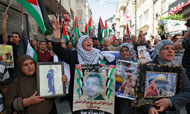
On Tuesday morning, April 2, Maysara Ahmed Abu Hamdiya, 64 from Hebron, died in Soroka Hospital in Be’er Saba’. Abu Hamdiya had been suffering from cancer of the throat and had been recently transferred from prison to the hospital. Abu Hamdiya, married and a father of four children, was a major general in the PA security forces. He was initially detained by Israeli forces in May 2002, and was tried and convicted of being a member of Al Aqsa Martyrs Brigades, the armed wing of Fatah, and participating in attacks against Israeli forces. He was initially sentenced to 25 years of imprisonment; however, on 22 April 2007, an Israeli court increased the sentence to life imprisonment. Diagnosed with cancer of the throat four months ago, his illness was at an advanced stage. In late March, Abu Hamdiyeh was finally admitted to the hospital, after the cancer spread to his spinal cord. Since the time of Abu Hamdiya’s initial arrest, he was denied family visits by the Israeli authorities however, some members of his family were allowed to visit him more recently, following the deterioration of his condition. Israeli authorities had rejected all demands for his release.
Lawyer Jawad Bulous, Director of the Legal Unit in the Palestinian Prisoners Club, was quoted in the media as saying that he visited Abu Hamdiya in Soroka Hospital two days before he passed away. Abu Hamdiya’s hands and feet were bound, and the Israeli guards refused to remove the restraints during the visit. Bulous stated that Abu Hamdiya had been in very serious condition, and was unable to speak.
On April 6, results of an autopsy on the body of Abu Hamdiyeh showed that his death was caused by medical negligence, according to a Palestinian official. The results showed that Israeli prison service neglected the medical situation of Abu Hamdiyeh for several years, Minister of Prisoners' affairs Issa Qaraqe said. He accused Israel of deliberately neglecting the prisoner who suffered from throat cancer. Qaraqe pointed out that Abu Hamdiyeh had been suffering from pain in his body since 2003, but Israeli prison authorities only gave him antibiotics and painkillers.
Expressing his sorrow and condolences, Prime Minister Salam Fayyad praised Abu Hamdiyeh's distinguished role in the national struggle for freedom and said "his contributions to the just cause of our people will remain alive in our national memory and continued struggle for freedom." There are 25 Palestinians diagnosed with cancer in Israeli jails. Some 207 Palestinians have died in Israeli jails since 1967, including 54 who died from medical negligence, the Palestinian Authority says.
Several clashes were reported on April 5 following the news of Abu Hamdiyeh’s deah. In al-Khader village near Bethlehem the coordinator of the local popular committee against settlements and the wall said that the clashes took place near al-Nashash military checkpoint, where protesters set tires on fire and soldiers fired tear gas canisters at them. He added that dozens were hurt by tear gas inhalation. Additionally, in the Kufr Qadum village east of Qalqiliya, Murad Shteiwi, spokesman for the local popular resistance committee, stated that Israeli troops raided a demonstration in solidarity with detainees in Israeli jails. Israeli forces fired tear gas and rubber bullets, but there were no immediate reports of injury. Clashes also broke out this week in Jerusalem. Several Jerusalemites were beaten and arrested on April 2 at a protest at Damascus Gate in solidarity with prisoners in Israeli jails. Israeli authorities have imposed strict restrictions on the entry to Jerusalem since then, particularly during Friday noon prayers at Al Aqsa.
Funerals for two Palestinian teenagers from Anabta, near Tulkarm were held on April 4. Soldiers in the area opened fire at Amer Nassar, 17, killing him instantly in what Israel described as a response to a Palestinian targeting a military post. The second victim, Naji al-Balbisi, 18, was only discovered after Israeli forces detained the body for several hours, and then at 4 a.m. they handed the body to a Red Crescent ambulance. Nearly 1,000 people turned out on the streets of Tulkarem in the aftermath. Mourners carried the youths’ body as the crowd chanted slogans condemning the attack. The incident came as clashes broke out in the West Bank -- particularly Hebron -- between Israeli soldiers and Palestinians protesting over the death of Maysara Abu Hamideyeh, who was given a military funeral in his hometown of Hebron.
On April 3, it was reported that the United Nations will provide financial support to thousands of Gaza families affected by last year's conflict with Israel thanks to a Saudi donation of nearly $16 million. "Over 7,000 refugee families in Gaza will receive financial support from UNRWA to repair and reconstruct homes damaged during the November conflict," the refugee agency said in a statement. UNRWA's Gaza operations director Robert Turner praised the "quick and generous donation by the Saudi Fund for Development. "We have never before been able to provide this scale of support for war-damaged refugees," he said. The total cost of the damage caused to Gaza -- which included the complete destruction of 200 homes and partial damage of another 8,000 -- was estimated at more than $1.2 billion.
UNRWA, however announced on April 4 that it would close its offices in Gaza after angry Gazans broke into them in protest of agency cuts on cash allowances to the most needy. UNRWA admitted to the cuts due to budget deficits but said it would provide the alternative of temporary employment to the families. Turner said the offices would only reopen after the agency is given guarantees that no other riots would take place.
Hamas re-elected Khaled Meshaal as its leader on April 2 despite past criticism of him by movement hardliners in the Gaza Strip. A diplomat in the region said Egypt and Qatar had lobbied strongly on behalf of a reluctant Meshaal before the vote in Cairo by about 60 Hamas leaders who had met through the night. Mashaal had indicated previously he would not seek another term, but in an interview on the 3rd, he downplayed the idea he would represent Hamas to run in presidency elections; but did say however, that heading the PLO “was a possibility.”
Finally, on March 31, a group of settlers from the "Yitzhar" settlement, established on Palestinian land south of Nablus, threw stones at school buses with students from the Ramon School for Girls on their way home from a fieldtrip to Qalqilya. As a result, 11-year-old Bushra Farah Abdul-Qader Kohla sustained cuts in the right side of her face after a stone hit her in the face. Also, many others sustained scratches because of the scattered glass.
Palestinians commemorate Land Day [March 24 - March 30]
Date posted: March 30, 2013
By MIFTAH
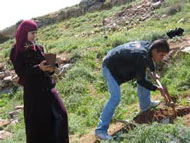
Today, Palestinians will commemorate Land Day. On March 30, 1976, six Palestinians from the Galilee were killed trying to defend their land from Israeli confiscation. Each year Palestinians remember the day with protests and tree-planting. Unfortunately, Israeli troops and settlers counter Palestinian efforts by cracking down on these activities.
On March 28, Israeli from the settlers from the Nevi Daniel settlement uprooted hundreds of olive trees and saplings in Al Khader south of Bethlehem.
According to Ahmad Salah, coordinator for the popular committee against settlements and the wall in Khader, the settlers uprooted about 200 olive trees planted a year ago by the local YMCA. They also sprayed graffiti saying “Stone uprising”. Several trees were planted in the Ramallah/Al Bireh area as well on March 28, each bearing the name of the Land Day martyrs.
Israel has beefed up its forces this week, which also marks the Jewish Passover holiday. The West Bank was closed off for two days at the start of the holiday with only ‘humanitarian cases’ allowed into Jerusalem and Israel. Furthermore, Israeli authorities imposed strict restrictions on Muslim worshippers during Friday prayers at Al Aqsa on March 29, allowing only men over 50 with Jerusalem ID cards to enter.
Six Palestinians were injured after Israeli forces prevented worshipers from praying at the mosque. Thousands of Palestinians performed prayers in the streets outside the Aqsa on the streets outside the Old City.
Jamal Kabaja, 54, and his son Muhammad, 18, were assaulted by Israeli soldiers as they made their way to Al Aqsa. Kabaja sustained bruises to his head and lower body while Muhammad suffered contusions to his hands and feet. Clashes also broke out in Hebron on Friday in commemoration of Land Day.
The mood was especially tense in Jerusalem and at Al Aqsa after ultra-orthodox Jewish worshipers entered the compound on March 28 to perform Passover prayers. A day earlier, dozens of Jews entered the Aqsa courtyard under heavy Israeli army protection; Palestinian worshipers were prevented from accessing the mosque during their ‘visit’. The break-ins come after right-wing Knesset member Moshe Feiglin called on Jews to enter the compound for Passover. Israeli police denied Feiglin entry for fear of ‘unrest.’ Still, scores of other settlers were allowed entry. According to Sheikh Azzam Al Khatib, 112 settlers entered the courtyards of via the Moroccan Gate.
Settlers also wreaked havoc in the West Bank. Other than uprooting trees, a group of settlers attacked an 80-year-old man tending his land in Tulkarem on March 29. Hasan Barhoush was in a private field in Kafr al-Labad near the settlement of Enav, when settlers attacked him. Barhoush was moderately wounded in the assault.
In a different kind of assault, Israel announced plans to allow a group of settlers to visit Solomon's Pools near Bethlehem on Sunday. The PA rejected the announcement, saying it would prevent them from entering the area. Deputy governor of Bethlehem, Mohammad Taha, said the decision was a "flagrant violation" of the Oslo Accords given that the pools are in Area A under Palestinian Authority control.
According to the Israeli media, the group planning the trip is from a school in the Gush Etzion settlement bloc. "Thanks to the cooperation with the army we will return to a land of ancestors that was given to the Palestinians after the Oslo accords," the school's principal Yaron Rosenthal said.
On March 27, Israeli forces announced they would confiscate 3,000 square meters of Palestinian-owned land near the Jalama checkpoint north of Jenin. Israeli authorities informed the owner that the land would be confiscated to enlarge the checkpoint and install a security gate at the main entrance.
Meanwhile, the PA said on March 29 that it would welcome Turkish Prime Minister Recep Tayyip Erdogan if he decides to come to Palestine. In a statement, the Palestinian embassy in Ankara said the Palestinian community “on every level” welcomed Erdogan and that any Palestinian city would be honored to host him.
The Palestinian statement comes after Erdogan said he may visit Gaza following Israel’s apology to Turkey for killing nine Turkish citizens on an activist ship in 2010.
On March 26 the one-day Arab summit in Doha concluded with two significant recommendations on Palestine. The first was a Qatari declaration to establish the Jerusalem Fund with a budget of $1 billion; Qatar has already pledged to pay the first $250 million. The other recommendation called for a ‘mini-summit’ to push forward Palestinian reconciliation, something which both Hamas and Fatah have welcomed. No date has yet been set for the summit, which will be held in Cairo.
President Mahmoud Abbas pardoned journalist Mamdouh Hamamreh on March 28 after he was handed down a year-long sentence by a Palestinian court for “insulting the president” on Facebook.
Hamamreh, a correspondent for Al Quds satellite channel was charged over a photo juxtaposing Abbas beside a similar-looking man who plays the part of a collaborator with French colonial forces in an old Syrian television drama. "They resemble each other in everything," a caption read.
Journalists and media groups claim Hamamreh was only "tagged" in the photo and did not post or disseminate it.
Finally, Palestinian officials have criticized Israel over the scarce number of permits allowed to Palestinian Christians this Easter. According to the PLO on March 24, parishes in Bethlehem and Ramallah only received 30 to 40 percent of requested permits to visit Jerusalem.
14 Emil Touma Street,
Al Massayef, Ramallah
Postalcode P6058131
P.O.Box 69647
Jerusalem
972-2-298 9490/1
972-2-298 9492
info@miftah.org







